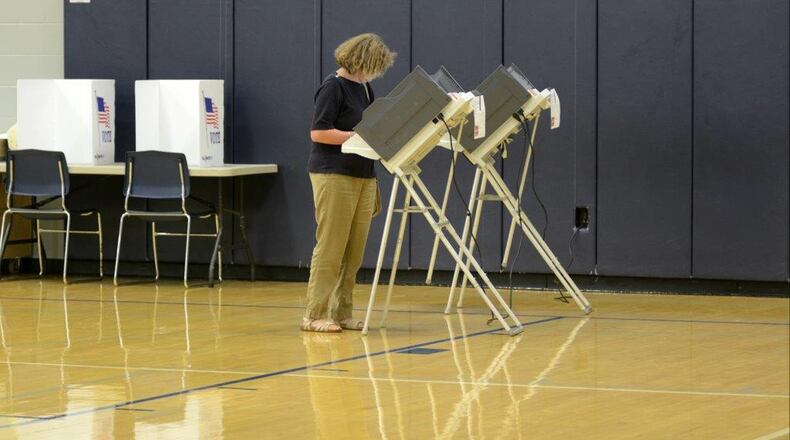Butler County has 52 polling places in schools — more than the rest of the Greater Dayton and Northern Cincinnati region combined.
Fewer school districts elsewhere are offering their buildings for voting.Most schools lock their doors daily after the opening bell, which isn’t possible if there is a polling place on the premises.
“In the end, I take student safety very seriously, and we’re going to do everything we can to keep our students secure,” New Lebanon Superintendent Greg Williams said.
County boards of election, by law, can use schools for elections, but it’s becoming a rarity to vote in the same buildings where kids study government and history. Fewer than one in five polling places in eight area counties are housed in schools.
“We used to be in schools. They asked us to leave,” said Brian Sleeth, director of the Warren County Board of Elections. “It was about student safety, voters being in the same area as students.”
Most county boards of elections have been flexible with the districts and relocated polling places when they could. But it can be difficult in some cases to find locations that have enough space and are handicap-accessible.
Some in Ohio have called for legislation that would make Election Day a holiday for schools, which would free them up for elections. It’s not unheard of; Kentucky public schools are not open when voters cast ballots.
“They’re suppose to accommodate us, but we decided for now to respect everybody’s wishes,” Sleeth said. “We absolutely have the law on our side. We’ve been very lenient. I want to see legislation.”
Miami County elections director Beverly Kendall has worked on the board for 18 years. She remembers when it was common for schools to serve as polling places.
“Gradually over the past 10 years, we’ve gotten out of schools,” she said. “It’s difficult to find places that are handicap-accessible, and a lot of schools are.”
Graham Middle School opened a new building several years ago in St. Paris, and it was used as a polling place for a primary election. It turned out to be a one-time deal.
“It did not work out for us at all,” said Meredith Bodey, director of the Champaign County Board of Elections. “People were up in arms about safety for the kids and didn’t want us in there.”
But Butler County is different, including the county seat city.
“At Hamilton City Schools keeping our children safe is our first priority,” said Larry Knapp, business manager for Hamilton Schools.
“That being said, on any given election day it is nearly impossible for us to be able to monitor who is coming into our buildings that day without impeding the voting process,” said Knapp.
“We felt it was in everyone’s best interest if we simply did not hold school that day, but instead welcomed our community to use the buildings. This way we can provide the best environment possible for the election process to take place,” he said.
“Office staff will be in the buildings, and we will also provide janitorial services as needed. The district will not be conducting any inservices (teacher training) with our teachers as we know parking can be a concern especially for our older community members, but without school in session, parking should not be a problem,” said Knapp.
Southwest Ohio’s largest suburban district - the 16,500-student Lakota Schools - will hold election voting in 18 of its 22 schools.
District-wide, there will be no classes for Lakota students, but staff will still report.
“Lakota has traditionally scheduled election day to be a day off for students, but still a professional development day for all staff,” said Lakota spokeswoman Lauren Boettcher. “Our facilities are publically-funded, so we appreciate the importance of opening our doors to our community on occasions such as this. At the same time, the safety of our students is paramount and the traditionally large voter turnout for a general election would force us to compromise our normal security procedures for visitors and guests.”
Superintendent Phil Cagwin in Monroe said that’s been the case for several years. The day is marked as a professional development day.
“It doesn’t have anything to do with Hillary or Donald and the negativity,” he said.
Monroe’s main campus is a polling place, and Cagwin said school is in session during the rare special election.
“That’s something we never used to worry about years ago, but as you have more incidents of violence, you are more vigilant,” Cagwin said. “We make sure the entrance to the building is one entrance only and (voters) don’t have access to the rest of the building.
Gina Gentry-Fletcher, spokeswoman for Fairfield Schools, said “when our buildings are open to the public during school hours, there is always a concern about student safety. With students out of the building, this eliminates that worry.”
